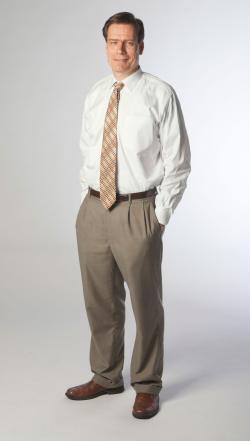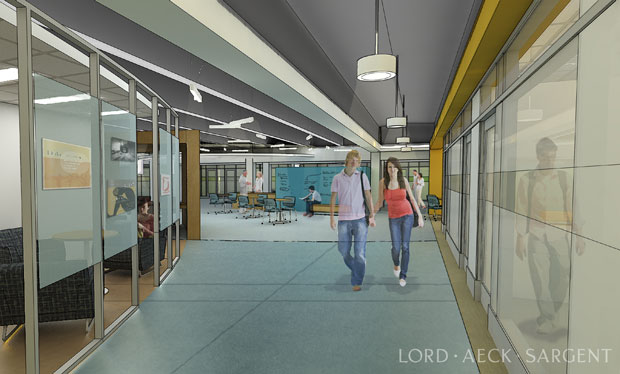
Thomas Nechyba, director of the Social Science Research Institute, discusses plans for opening SSRI West in Gross Hall this year and how it will advance the institute's mission. The interview was published in GIST, the news magazine for SSRI.
Read MoreQuestion: As an economist, what appealed to you about the position of director of the Social Science Research Institute?
A: During my tenure as department chair, we built an economics faculty that is intellectually broad and engaged on problems of deep social significance. But solutions to such problems rarely lie fully within the boundaries of a single discipline, and so I came to appreciate the extraordinary power that lies in collaborations. To be more precise, I came to understand interdisciplinarity not as something internal to any individual scholar -- but rather as something that happens when individuals who are rooted in disciplines find ways of leveraging their expertise with that of others who find their home in different disciplines. The pursuit of such collaboration lies at the heart of SSRI -- and I became intersted in directing SSRI when I became aware of an opportunity to place this mission of the Institute much more at the core of the university than has been possible in SSRI's current configuration.
Question: SSRI is home to half a dozen affiliates, addressing research questions on race and gender, decision science, globalization, population, networks and policy around children and families. In fall 2013 there will be a second location for SSRI known as "SSRI West" over in Gross Hall on West Campus. Why the move and how does the new location change the mission of SSRI?
A: That is precisely the opportunity that got me excited about coming to SSRI. The SSRI affiliated centers are doing extraordinarily important work, but the work is largely taking place off campus in our current 9th Street location. SSRI therefore has only had limited success in engaging the larger social science community of researchers and students on the main campus. SSRI-West gives us a chance to move the Institute to the next level -- to bring the data, methods and educational infrastructures to Gross Hall and employ these to incubate and facilitate new research collaborations involving teams of faculty, post-docs, graduate students and, in many instances, undergraduates. That does expand our mission in SSRI -- from one primarily focused on supporting our affiliated centers to one that seeks to engage scholars across the university with one another. I call it an "expanded" mission because it will strengthen our support of the affiliated centers -- by providing new opportunities for these centers to collaborate with one another and with those currently not engaged with SSRI.
Question: People are hearing a lot of buzz about the new space in Gross Hall -- modern look and feel, team rooms, coffee bar, places to mingle, etc. What is one area of the new space that you are most excited about?
A: I think the area that excites me most is what we are beginning to call "The Connection" -- the large open space in which scholars who might never run into each other will cross paths as they engage in projects, teach classes, attend seminars or just come for a cup of coffee. The most innovative places in the world -- places like Apple and Google -- figured this out some time ago: The best new ideas rarely come from the top down but rather emerge from the bottom up as unexpected interactions spark new ideas that lie outside our pre-conceived boxes. "The Connection" is our attempt to bring that idea to life in the social sciences -- to connect people with one another in ways that create the new and unexpected, and to maximize the chance for the success of such connections with enough structured activity and infrastructure.
Question: What group of people do you think will benefit most from SSRI West?
A: Faculty and students -- whether or not they are currently engaged with our affiliated centers -- who ask big questions of societal importance but need a place and an infrastructure to connect to others who are asking similar questions. And this doesn't mean just social scientists. While the questions are often at the core of the social sciences, the necessary collaborations may lie with experts in other fields, experts like those in the Information Futures group that deals with Big Data and is moving to the third floor of Gross Hall, just above SSRI-West; or experts in the natural sciences whose experise lies in areas as varied as environmental science and brain science; or experts in the humanities that can help to bring the human dimension to projects at the core of the social sciences.
Question: What do you think is the biggest assumption or misconception about interdisciplinary research and education?
A: I think the biggest misconception we have is that interdisciplinarity resides in the individual. It rarely does. Rather, interdisciplinarity resides in teams -- teams that find ways of harnessing disciplinary expertise in the pursuit of solutions that require multiple such areas of expertise. None of this is easy, and it can't happen in a vacuum. The role of places like SSRI is to, in a sense, provide and fertilize the soil on which such teams can grow and thrive -- through space, infrastructure and connections.
Question: Where do you see SSRI in the next three years?
A: My hope is that three years from now, no one at Duke will wonder what it is that SSRI does -- that, through the connections created in SSRI-West, we will play a central role in supporting the university's mission of research and teaching in the service of society, and that, at the same time, our affiliated centers will have found ways to engage with one another and with new communities through the opportunities that SSRI-West provides.
Pictured below: A rendition of SSRI West in Gross Hall.
